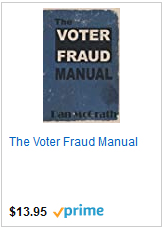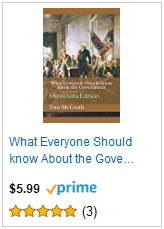
US Elections: A Crisis of Confidence
Whether or not fraudulent votes corrupted our election systems isn’t even relevant to the immediate problem. It is a crisis of confidence brought about by a small cabal of heavy-handed officials.
Over the past three centuries, the United States of America has enjoyed, almost exclusively, peaceful and orderly transfers of power from one administration to the next. In the context of world history, that’s a very rare blessing.
The reason for this persistent good fortune has been confidence in our elections. We’ve always known that while we don’t always get our way, if our cause is worthy and we’re persistent in convincing others, we can change our government and our voices will be heard.
Things have changed. Not since the Civil War have so many Americans felt disenfranchised.
Whether or not fraudulent votes corrupted our election systems sufficiently to sway the outcome of any elections isn’t even relevant to the actual problem.
Faith in Elections at All-Time Low
Before the 2020 election even took place, an NBC News poll found in August that 55% of adults were either “not too confident” or “not at all confident” about the fairness of the election. Just 14% said they were “very confident.”
Despite non-stop assurances from major news outlets and election administrators of the near-infallibility of America’s numerous election systems, most of us weren’t convinced. That in itself is the problem and bombarding us with more propaganda about the supposed infallibility of the system isn’t going to fix it.
Even setting aside any evidence of past or present fraud of any amount, this crisis of confidence isn’t without cause and it doesn’t merely stem from baseless tweets.
Shoehorning Last-Minute Election Changes
Just prior to the 2020 election, left-leaning secretaries of state across the country attempted, with varying degrees of success to do away with a number of election procedures that had been put in place by the state legislatures for the sole purpose of preventing voter fraud.
In Minnesota, one such action resulted in the temporary suspension of a law against ballot harvesting, which is the practice of one person collecting large numbers of absentee ballots and submitting them in bundles.
Another action removed the requirement of a signature from another registered voter as a witness on absentee ballots.
Yet another action attempted to do away with deadlines for the accepting and counting of absentee ballots, which is in place for the obvious purpose of preventing ballot box stuffing after the counts are known.
All of these subverted election procedures were previously debated and agreed upon by both Republicans and Democrats in the legislature and approved by the governor after being passed in the House and the Senate on an almost universally bipartisan basis. They weren’t suggestions. They’re the law.
In every case, the decision to do away with Minnesota’s anti-fraud measures rested with just three people. Democrat secretary of state Steve Simon, Democrat Attorney General Keith Ellison and a Democrat-appointed judge (Sara Grewing and Thomas Gilligan were both appointed to fill vacancies by governor Mark Dayton). The changes were objected to by the Republican Party and legislators and were never put before any lawmakers or voters for approval.
Some of the changes brought about by consent decrees were later overturned after appellate lawsuits by the Republican Party and the Minnesota Voters Alliance, but not without impact to the 2020 election.
Procedural changes that would produce similar outcomes were attempted or carried out in 14 other states – entirely by Democrats in power and over the objections of Republicans.
These changes undeniably make fraud easier to commit and harder to detect but what effect that had on the outcome is almost impossible to quantify after the fact. Forensic investigations of election results can take months or years to conduct and that assumes there’s cooperation from election officials who control access to all the data needed to conduct such an audit. Minnesota’s Steve Simon and other Democrat secretaries of state have become increasingly unwilling to open the books for outside examination in recent years.
The increased use of so-called “early voting” or mail-in ballots and the advent of legislatively unauthorized, unsupervised ballot collection boxes meant that opportunities for citizen and partisan oversight of election operations were diminished.
An Election Paid for by Special Interests
At the same time all these changes were occurring, private money from Facebook’s Mark Zuckerberg, Google and others was being funneled directly into the budgets of election administrators through grants from the left-wing non-profit Center for Tech and Civic Life. CTCL is an ideological outfit and the millions of dollars in grants came with strings attached, requiring the election administrators to implement procedures favored by the organization. This would be like having the election sponsored by the NRA or the Heritage Foundation if the money came from conservative donors.
We can’t presently know exactly to what degree these factors might have undermined the integrity of the 2020 election. We can, however, be certain that all of it severely undermined voter confidence in the fairness and accuracy of the system.
Serious reforms are going to be required before that confidence can ever be restored.
Be sure to Bookmark DanMcGrath.net and subscribe to be informed when new items are posted!






Eternal vigilance is the price of Liberty. We dropped the ball on this, though we were strongly encouraged to do so.
Amen. Time to pick it up again….